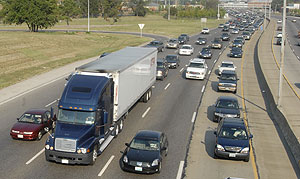WUSTL and BJC HealthCare are working with the Missouri Department of Transportation (MoDOT) to ensure that the $535 million reconstruction of Highway 40 has the smallest possible impact on employees, students and patients.
The project, called The New I-64, will replace 12 miles of highway, interchanges and more than 40 bridges from west of Spoede Road to Sarah Street, just east of Boyle Avenue. In addition, the department will rebuild Interstate 170 from south of Brentwood Boulevard to Eager Road.

A joint task force made up of representatives from the Danforth and School of Medicine campuses and medical center institutions is studying how the project might affect employees, students, patients and others, addressing concerns and working to develop alternatives and solutions to minimize the inconvenience for the University and BJC communities.
“Our joint task force has made MoDOT officials and the involved construction firms aware of the unique role we play in providing critical health-care services for our community and has proposed several ideas for sequencing the highway construction project in a manner that would preserve access to the medical center campus,” said James P. Crane, M.D., associate vice chancellor for clinical affairs, chief executive officer of the Faculty Practice Plan and leader of the joint task force.
Crane stressed that the joint task force would be working with administrators and clinical managers to provide visitors and patients with information to make their trips to both campuses and physicians’ offices as smooth as possible.
June Fowler, BJC vice president of corporate and public communications, sits on MoDOT’s I-64 Connection Committee, an information and communications conduit between transportation officials and the public.
“While we support the improvement of the highway, we knew it was important to provide transportation officials with factual information on the consequences to patient care and safety if there was not thoughtful planning around the issue of traffic management during construction,” Fowler said.
MoDOT expects to choose a contractor by the end of this year, said Linda Wilson, community relations manager for the New I-64 project. The contractor then is expected to begin work next spring with a finishing date of Oct. 1, 2010.
When construction begins, MoDOT will post its construction schedule on the New I-64 Web site (thenewi64.org) to let motorists know what is scheduled for that day, that week and that month, Wilson said. She also recommended that motorists start using www.GatewayGuide.com, which has cameras on all major highways in the area.
“It’s not too early to be thinking ahead about the impact of the project on your commute and other commitments such as dropping off and picking up children or activities after work,” said Ann Prenatt, vice chancellor for human resources at the University. “We all need to be thinking about what we may have to change and start looking at the alternatives so that we have a plan in place ahead of time.”
|
Transportation alternatives The University already has several alternatives in place to lessen the impact of the construction. MetroLink MetroLink opened its Cross County Extension Aug. 28, adding eight miles of light rail service across seven St. Louis County municipalities. Additionally, MetroBus service routes were redefined to better coordinate routes and minimize transfers. The University’s Gold, Red and Blue shuttle lines have been phased out and replaced with Metro service that largely will follow the same routes and schedules previously served by the University’s shuttles. The University also will provide a “Hilltop Campus/South 40 Circulator” that will provide shuttle service from the new MetroLink station at Skinker Boulevard and Forest Park Parkway, to various locations around the Hilltop Campus and the South 40. Starting July 1, WUSTL began offering its full-time students and benefits-eligible faculty and staff free access to the MetroBus and MetroLink through the Metro Universal Pass. The arrangement provides about 25,000 members of the WUSTL community with reduced commuting costs and the advantages of public transportation. The Parking and Transportation Office’s Web site (transportation.wustl.edu) provides information about other transportation alternatives available to employees and students as well as a link to Metro’s TripFinder feature (tripfinder.metrostlouis.org), which allows users to enter their start and end points and find a public transportation route that conforms to their schedules. RideFinders and carpooling RideFinders is a regional rideshare program that helps commuters find other commuters for carpools or vanpools. RideFinders assists commuters working in St. Louis City; St. Louis, Franklin, Jefferson and St. Charles counties in Missouri; and Madison, St. Clair and Monroe counties in Illinois. Go online to ridefinders.org for information. Employees also can set up their own carpools with neighbors or friends who also work at the University. Guaranteed Ride Home WUSTL participates in the Guaranteed Ride Home Program through Citizens for Modern Transit. The program enables employees who carpool, take Metro or ride their bicycle to work to take a discounted taxi ride home if they or an immediate family member becomes sick, or if they have unexpected, unscheduled overtime. Citizens for Modern Transit covers 80 percent of the trip’s cost up to $40 per emergency ride home. Go online to cmt-stl.org for more information. Bicycling to work Bicycle racks are located around the campus near many buildings for the convenience of employees who choose to ride their bikes. |